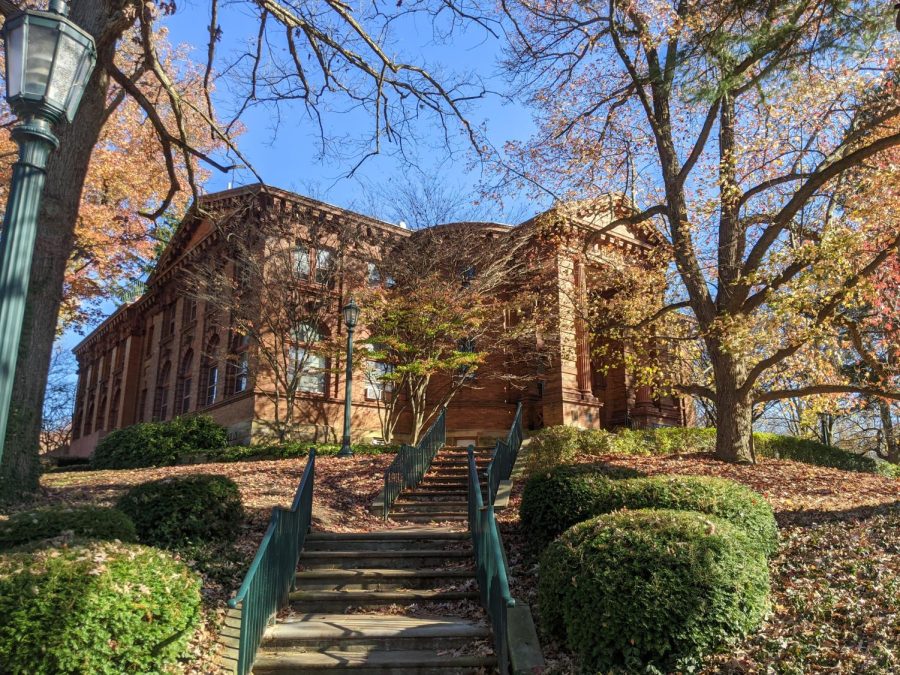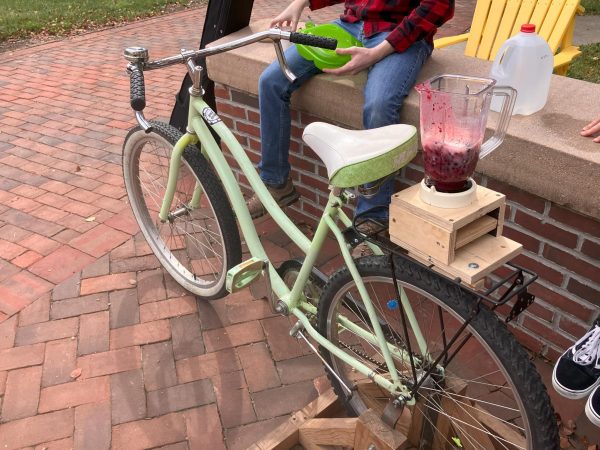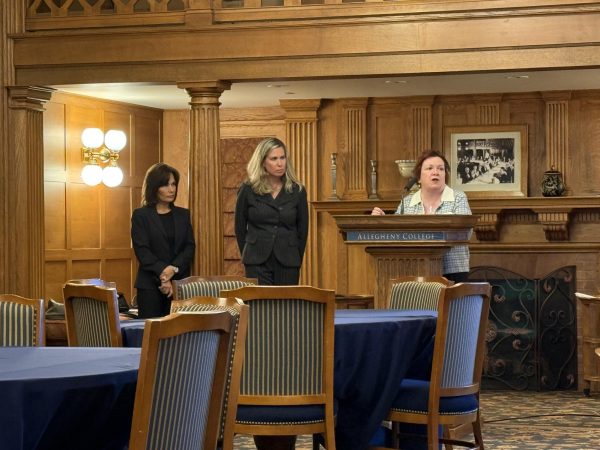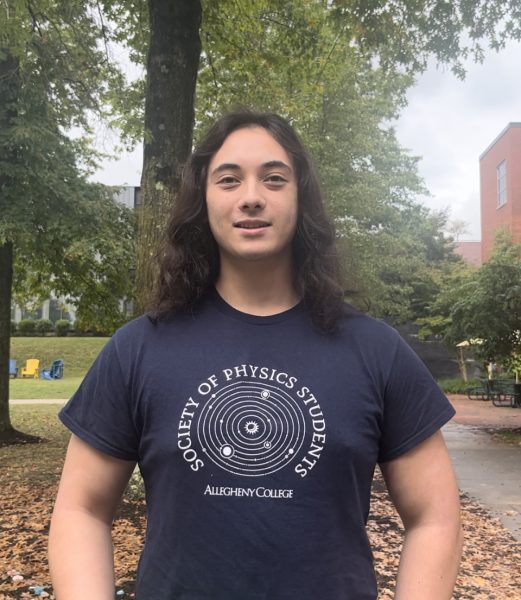Reis renovation, future projects accelerated by state funding
Reis Hall, as seen from Brooks Walk. The hall was initally constructed in the early 20th century to serve as the college’s library.
Allegheny College is the recipient of a “$2 million Redevelopment Assistance Capital Program (RACP) grant from the Commonwealth of Pennsylvania,” read an email sent to the community on Oct. 27. The grant will be used for the renovation of Reis Hall and the development of a home for the Center for Business and Economics, both of which will “provide the space, infrastructure, and technology to train community members and students to fill jobs that are central to the region’s economic development,” according to a different email sent to faculty on Oct. 26.
Vice President for Institutional Advancement Matthew Stinson said plans for the renovation of Reis Hall are more developed than the plans for the future of the CBE.
“We just listed both of those projects because we thought it would enhance our ability to get a larger (grant),” Stinson said. “We wanted to include both in the application so they understood the broader vision.”
The Institutional Advancement team dedicated to RACP worked on the application for approximately a year, which is longer than normal, according to Stinson.
“(RACP is) not a normal grant,” Stinson said. “It’s a much more complicated process when dealing with the federal or state government.”
One criterion of RACP was that applicants could only submit projects developed enough that they could be under construction within one year of being awarded the funds. Additionally, Stinson said that interpersonal relationships played a larger role than is common during standard grant processes.
“We had some good relationships with our elected officials, which is key,” Stinson said. “You won’t get (RACP) without those relationships. Quite frankly, I don’t believe the college would have received $2 million without (two members of the Board of Trustees’) insight and some of their connections. I think we would have gotten $500,000.”
RACP requires Allegheny to commit to matching the $2 million grant. Stinson said Allegheny currently estimates spending $14-20 million on the renovation of Reis. The entire renovation will be funded by donations and grants, not by reserve funds or operational dollars.
“In order to make it happen, it will require significant and generous contributions from our alumni and friends,” Stinson said.
Going forward, Provost Angela Haddad will lead the process of consulting with faculty, staff, senior administrators, students and community partners to determine the details of the projects.
“Our general plans (for Reis Hall) are to develop a center for innovation, as well as a variety of other programs that would fit in the model of this new innovative hub where we would have collaborative spaces for students and faculty, including some space for potential community partners to engage in,” Haddad said.
One of the programs that will be central to Reis’ future is the Allegheny Lab for Innovation & Creativity.
“ALIC is (transitioning) from being just a physical space to being an intellectual framework for the way in which we engage with the liberal arts in a more future-facing way,” said Director of Academic Innovation Partnerships, Department Chair and Associate Professor of Art Byron Rich. “ALIC is about showing the value of the liberal arts through the lens of emerging technologies.”
The current plan is for Reis to contain a multitude of facilities, including robotics labs, podcast and video recording studios and large-scale fabrication facilities containing equipment for 3D printing, laser cutting, artificial intelligence research, computer servers and much more.
The future development of ALIC is guided by three goals.
“We would really like to see the new expanded version of the lab be a place where local companies can come to do research and development,” Rich said. “We would also love to work on helping students build a vibrant little start-up culture in Meadville and make sure we are equipped to help students bring their biggest ideas to life. And we (want to explore how to) share the best of what Allegheny is with more people in an incredibly affordable way that helps our community build resilience.”
Stinson said training both students and community members will help ease shortages in western Pennsylvania’s technological professions.
“Our primary focus at first will always be students, but we believe there’s an opportunity to branch out to help the community in that educational process as well,” Stinson said.
Haddad added that the community partnership plans are still developing.
“We’re looking to partner with nonprofits specifically to think about how we can create a more sustainable and vibrant community,” Haddad said.
Additional programs housed in Reis could include the computer science department and an interdisciplinary humanities department.
Both Stinson and Haddad said the development of the CBE is a long-term project that is still in its early stages.
“The idea is to develop a new home for the Center for Business and Economics,” Haddad said. “We’re still trying to identify another partner that would be interested in helping us fund the project.”
Chair of the Business and Economics department Tomas Nonnenmacher said he was not aware of the RACP grant until he received the email sent to all faculty on Oct. 26, although he had had informal discussions with Stinson and President Ron Cole, ’87, in the past about the future of the CBE.
“I’m not sure what direction the college will go in,” Nonnenmacher wrote via email. “(Pre-COVID), we had architects provide plans for renovating Quigley Hall or adding space onto it. The college may decide to do something like that or it may decide to build a new building.”
Regardless of the specifics, Nonnenmacher hopes the CBE and the Law & Policy program will be granted their own prominent communal spaces.
“There’s no real space that those programs occupy (currently), so there’s nothing you can show people and say that this is the space that represents a lot of the really good things we’re doing in the department,” Nonnenmacher wrote.
Stinson and Cole have told Nonnenmacher that the Business and Economics department will be involved in the decision-making process before any concrete changes occur.
Stinson said that, although he does not have training in construction, he thinks the Reis renovation will be underway by next summer or early fall. He anticipates it will not be a multi-year project.
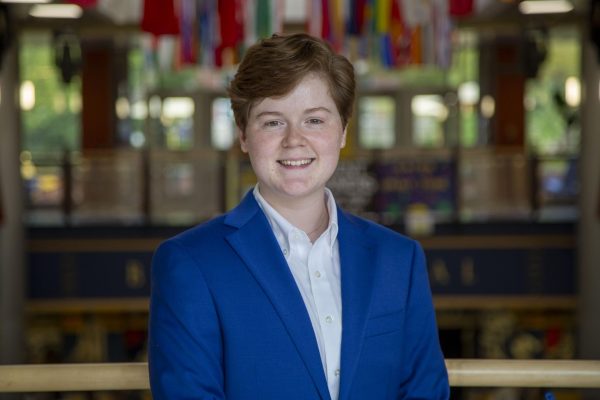
Anna Westbrook is a junior from the Washington, D.C. area. They are majoring in Environmental Science and Sustainability with a concentration in law &...

Sami Mirza is a senior from many different places. He is majoring in International Studies with a focus on the Middle East and North Africa and minor in...



